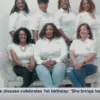Growing up in a small farming community in Kansas, Corey Yeager was very close to his father. But when he was just 15, his father died, leaving Yeager angry and full of grief.
To deal with the loss, he channeled his anger and aggression into sports. At 6’3” and 300 pounds, he used football as his therapy and, eventually, his ticket to college.
Yeager ended up in Long Beach, California, and later moved to Minneapolis, where he married, had five boys (three biological and two adopted), and went on to get a master’s degree in psychotherapy and a PhD in family social science. By “not much of a choice” of their own, all five boys ended up playing football, and Yeager coached them by using “all these things that I was learning in the psychological realm,” he says.
Realizing there was a broader need for psychological support in coaching, he started flooding email inboxes of NFL and NBA teams to offer his services, ultimately landing a position as psychotherapist for the NBA’s Detroit Pistons. After spending five years with the team, he is now working independently with various NBA and NFL players and consulting with the new United Football League (UFL) — the spring league that merged the XFL and USFL — as director of mental wellness.
He also recently wrote How Am I Doing?, a list of 40 questions to ask yourself that Yeager hopes will help people become the best versions of themselves.
Patrice Harris, MD, FAPA, a psychiatrist and Everyday Health’s chief health and medical editor, discusses the book with Dr. Yeager as well as their shared passion for mental wellness in both sports and everyday life.
Editor’s note: This interview has been edited for length and clarity.
Patrice Harris: I’m going to quote your book: “It’s okay for me to stumble. It’s okay for you to stumble. Because sometimes we stumble into magic.” I love this. Tell us about the book and what inspired you to write it.
Corey Yeager: The book to some degree found me. When I was with the Pistons, Oprah Winfrey and Prince Harry were executive producers for the documentary The Me You Can’t See, about different people’s journeys toward mental wellness. They followed me and my work with the Pistons for almost a year. And then probably six months after the documentary came out, I received an email from HarperCollins that said, “We think you have a book here.”
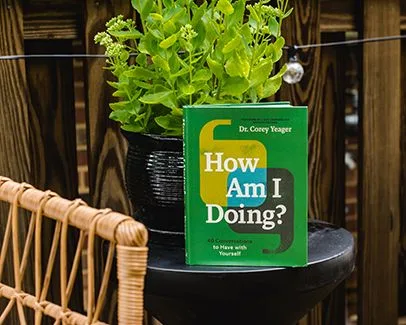
So I began to write my first book, How Am I Doing? 40 Conversations to Have With Yourself. Really the focus of the book is about how do we talk to ourselves? How do we engage with ourselves, how are we curious with ourselves? We do a good job as human beings of engaging other humans. But we don’t conduct that same level of curiosity with ourselves. So the book is a journey toward saying, “Let’s get to know who we are and let’s put ourself in the the No. 1 position in life, as opposed to being third or fourth or fifth.”
I say to my wife and my kids all the time, “Before I can be a good therapist, before I can be a good husband or a good father, I have to first be a good Corey to Corey.” And that really is the genesis of the book. It’s about ourselves and how we can be better acquainted with who we are and how we came to be who we are.
PH: There are a lot of conversations about self-care today. Talk about these 40 conversations and how they relate to opportunities for self-care.
CY: Self-care has been almost a buzzword; it’s been thrown around so much, especially in our work. I think it’s so deeply and profoundly important for us to engage with taking care of ourselves. That’s really what the purpose of the book is in a circuitous way.
How do we take care of us? Before you can take care of anyone in this world, ourselves included, that means we have to get to know ourselves. And I don’t think that we do a great job of that.
In our profession, we think about this idea of being healers. Healing must come from within: within a community, a religion, an individual, a family. But oftentimes somebody or something may need to facilitate and nudge that healing forward.
At the age of 15, I lost my father. So I was wounded from that for quite a while. But as I healed myself throughout that journey, I began to find ways that I could be supportive of others. I became what I frame as a wounded healer: We can reference our journey in helping others. This has become the passion of my lifetime.
PH: Talk about your work and your patient population. Has it been mostly in the Black community?
CY: I work primarily in the African American community and I’m a community-based therapist. And any time that we talk about the athletic realm, especially the professional NBA and NFL, they are predominantly African American. That’s not new to any of us.
So my work in sports is often with Black and brown men. And if I had to pick a population that I feel the most comfortable with and that I think that I do the best work with, it is with African American males, usually that generational time frame of high school — 15, 16 years old — upwards into the thirties.
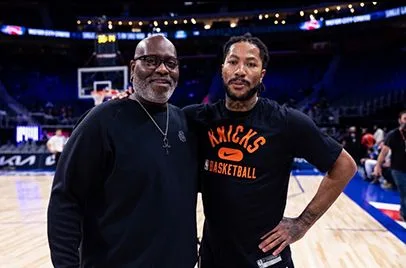
I do a lot of work not just with our players, but also with their relationships, their parents, their significant others. I’m a family therapist by craft and by trade, so I focus a lot on that family idea. I also recognize that in sports, a team is another family system oftentimes by choice, not by bloodline. I’m born into a family that’s extremely important, but I also get to choose a set of people that become family, and that’s also very important. That is predominately the space that I engage with the most.
PH: Let’s talk about two things you’re very passionate about, athletics and mental health. You and I have heard about stigma: It’s a weakness if you have issues around mental health, although that’s less so today than it used to be.
So how have you worked to get young Black men to open up? What’s your secret sauce?
CY: There is some difficulty there because we’re asking players to be vulnerable. I had a young cat with the Pistons a few years ago, Blake Griffin, a player who’s been an All-Star in the league. And he was making at the time around $37 million a year. Just imagine that all of a sudden, that’s the money that you’re making. So to ask those young men to be vulnerable is really a stretch.
So what would I say is the secret sauce? I don’t know if it’s a secret, but maybe it’s a sauce. What’s been most impactful for me in the way I support players, first and foremost, is that I use the language of the players.
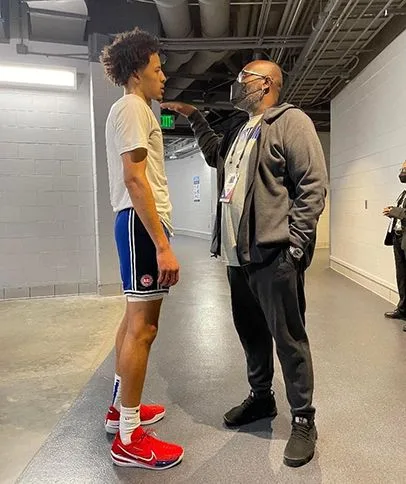
They’re interested in finding ways to support themselves off of the court that will also make them a better player on the field or on the court. That’s the work that I do.
My version of the secret sauce [with the Pistons] was to be around all the time. I was at every practice, I traveled on every road trip. We would be on the road for 10 days staying at different hotels. I would set up in the lobby every evening, usually reading a book or writing. So they would always see me. I was always present. And the more you see someone, the more comfortable you can be with them. And then what happened was unwittingly, unknowingly, I began to do a lot of my therapeutic support right there in the lobby.
They would come and sit down and strike up a conversation, “Hey doc, I’ve been meaning to talk to you. Here’s my struggle. Here’s what I’ve been dealing with. What are your ideas and thoughts around that?” And that became the cornerstone of my work: I was present and they could trust that I would be around.
Also in terms of that secret sauce, the very first time I met with a new player, I said, “Anything that you talk to me about is for you and I.” Our conversations are in confidence. That is trust building.
And all of that is rooted in being present all the time so they can build a relationship. My success with the team is if I become an uncle to these young men. And I happen to be an uncle that has some deep and solid psychological chops.
But before I’m a psychologist or a psychotherapist, I’m first a man who has been an athlete. So I know what it is to be at 5 a.m. practices. I know what it is to be coached hard and have a coach scream and yell at you.
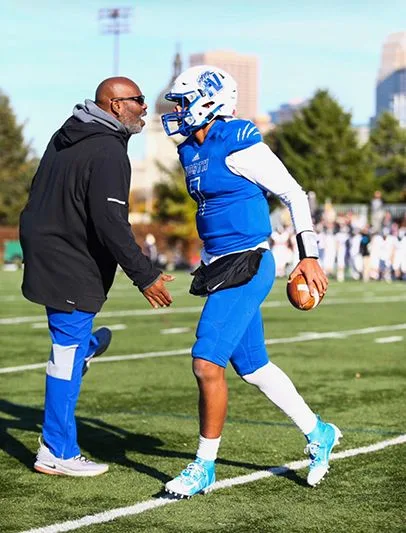
And I won’t sound like a psychologist. I will sound like a friend talking to you because I’m utilizing the language of the players. I’m not saying, “Well, let’s talk a little bit or let’s do a genogram” — they don’t want to hear that.
I’ll sound more like, “Tell me a little bit about Mom and Pops, tell me a little bit more about your siblings. And so you’re the third of four. How’d that work out for you as you were growing up?” So I’m doing that psychological support, but it sounds like a buddy or an uncle.
And that to me has been that secret sauce: being present, building trust, utilizing the language of the players.
PH: By the way, what’s the new United Football League? I’m excited.
CY: There were two leagues: the XFL and the USFL, and they merged about six months ago. So the UFL is a spring developmental league. The NFL ends in February, and then in March, the spring football league kind of takes over.
We’re starting to move toward year-round football. I’ve been tagged with being the consultant and the collaborator to set up the mental wellness support and practice for the entire UFL league.
I’m still working a lot with NBA players and NFL players, but I’m really excited about developmental opportunities for young people that may not be at the top level but are trying to get there, and how I can be supportive and explain to them the impact that life has on their ability on the field or on the court. It’s really exciting work.
PH: We’ve seen Simone Biles and Naomi Osaka be very public [about mental health]. As a child and adolescent psychiatrist, I’ve worried about the pressure. We want to make sure that kids have a childhood, and elite athletes start early.
When people need to take a break, they need to take a break. What are some things that we need to learn about athletics and young kids in general?
CY: Sports in general are a great metaphor for life: the ability to be part of something bigger than ourselves. Sports is really a family. What can you learn from that sport that can be applicable across life?
You talked about Simone Biles and Naomi Osaka. The courage and vulnerability that they had to have to be at the top of their sport and say to the world, not just the world sporting community, “I need some time. I need a break.”
A lot of people would say, “Well, that’s a quitter.” That’s so not the case. Every one of us has a point where we need a break, where we need to be able to take a breath. I think Simone did a great job of saying, “You don’t have to understand my struggle. It is mine. I love that I have fans and people that love and support my sport and what I do. But my well-being is more important than all of that combined. I have to be okay with where I am and where I’m headed. If I feel as if I’m not, it’s okay for me to say, ‘I need a break.’”
People who are not Olympic athletes or at the top of the tennis world are having struggles every day as they go to work. Are they okay with telling their boss or their family members that they are struggling and need a break, and need to find an outlet and a way to relieve some of this pressure?
I think we can learn from what these athletes have shown us and we can utilize that. It’s okay to be vulnerable and it’s okay to say, “I need a break and I need support and I need help.”
But this rugged, individualistic society that we live in has told us, “You got to pull yourself up by your bootstraps, you’ve got to push through.” And the research tells us that people don’t use their sick time and their mental wellness time because they don’t want to be seen as the person that didn’t push through.
But if I do push through and I don’t utilize those mechanisms that I have, I can’t be the best version of myself. I can’t be the best employee. I can’t be the best tennis player. I can’t be the best gymnast if I don’t first take care of myself. And that’s really in summary what my book was focused on: We’ve got to be okay with ourselves first, and the journey to being okay with myself is getting acquainted with me.
I look in the mirror every morning and play a Bill Withers song, “Lovely Day.” He says it’ll be a lovely day because the person he’s in a relationship with will make it a lovely day. I take that a step forward, saying that if I look in the mirror and I’m okay with Corey, it’ll be a lovely day because Corey’s all right with Corey, and it’s beautiful that my wife loves me and my kids love me. It’s more important that I love myself and all the blemishes and faults and things that come along with being a human being and that human condition.


